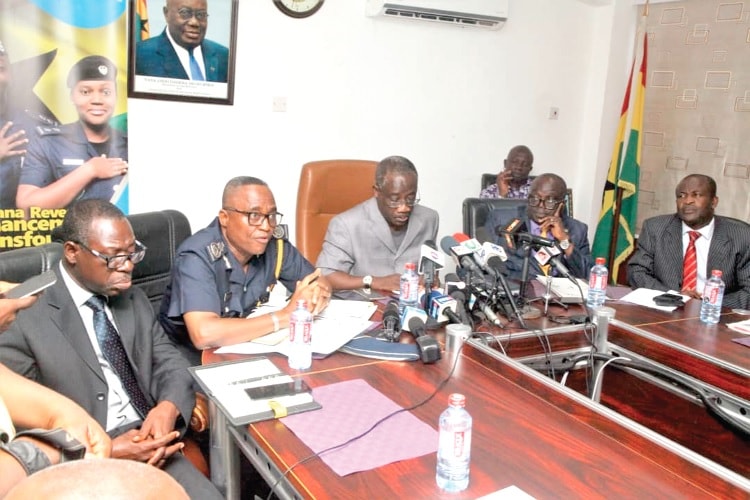
Cargo Tracking Notes have come to stay – GRA boss declares
The Commissioner General of the Ghana Revenue Authority (GRA), Mr Emmanuel Kofi Nti, has said the Cargo Tracking Notes (CTN) module has come to stay.
He said the implementation of the module, which took effect from yesterday, had many benefits for the state and there was no turning back on the policy.
He explained that the module would not affect small and medium-scale importers.
But freights forwarders and the Ghana Union Traders Association (GUTA) had stood firm in their opposition to the CTN.
They expressed their displeasure at the decision of the GRA to commence with the module, describing it as being in bad faith.
The policy requires that importers obtain a CTN number for shipments into Ghana and for the monitoring and collection of taxes on imported products.
It is also aimed at supplying adequate data on cargo for the government and reduce forgery of documents at the ports.
Exemptions
Briefing journalists yesterday, Mr Nti said some exemptions had been put in place to ensure that small and medium-scale importers, mostly small traders, market women and men, small distributors and other small to medium businesses were free from the requirements of the intervention.
He said only importers whose imports exceeded 36 Twenty-foot Equivalent Units (TEUs) per year were required to obtain the CTN number in the country of export.
“This means that any importer who imports less than 36 TEUs or 20-footer containers or 18 40-footer containers per year is exempt from CTN compliance. Such importers are not required to obtain CTN from the country of export,” he explained.
In addition, he said, businesses that imported more than 36 TEUs; that is, more than 36 pieces of 20-footer containers or 18 40-footer containers per year but could demonstrate that the nature of their imports and their turnovers made them small importers would also be exempted.
Malpractices
Mr Nti said the CTN would cure a number of malpractices, including under-valuation of shipment, concealment of higher rated products, deliberate misclassification of shipments by importers, manipulation of details of port of origin, volume /weight misrepresentation, using a lower-rated product to hide a shipment of a higher rated product and over-invoicing of shipment.
He said the CTN was mainly to improve services by aligning its operations along with trade facilitation and security recommendations by the World Trade Organisation (WTO) and the World Customs Organisation (WCO).
He said it was also in accordance with new standards for international cooperation between member states of the International Maritime Organisation (IMO).
“By implementing the CTN system, Customs is seeking to modernise its operations to facilitate the movement of legitimate trade in line with international best practices,” he said.
Resistance
While the GRA boss was highlighting the relevance of the CTN, freight forwarders and members of GUTA were also kicking against the policy at the Tema Port.
According to the leadership of GUTA and the Ghana Institute of Freight Forwarders (GIFF), the decision by the GRA would drastically affect trade revenue, although officials of the GRA had made the public to believe that the policy would catapult the country’s port revenue.
The two groups questioned the basis for those exemptions announced by the GRA.
“What legislation is the commissioner general applying in the exemptions he claimed to be granting businesses? Or has the issuance of a public directive on the policy overridden Ghana’s parliamentary role?” the President of GIFF, Mr Kwabena Ofosu Appiah, quizzed.
In the same vein, the President of GUTA, Dr Joseph Obeng, described the action as an affront to free trade flow owing to what he described as the GRA creating confusion within the trade space, which he said would not augur well for anybody.
Reports
In an interview with the Daily Graphic at the Tema Port on Monday, Mr Ofosu-Appiah stated that although members of the Joint Business Consultative Forum (JBCF) had expected President Nana Addo Dankwa Akufo-Addo to review the report from the several engagements over the policy to inform his decision, the GRA had hurriedly presented what seemed to be a different report to the President.
Mr Ofosu-Appiah also expressed worry at what he described as the flagrant disregard for the country’s laws and international treaties on international trade which Ghana was a signatory to.
“The Advance Shipment Information (ASHI) which was to be implemented by the Ghana Shippers Authority (GSA) had a legal backing from Parliament so why is the GRA fixated on the idea that the CTN is a trade facilitation tool and, therefore, does not require legislative backing?” he questioned.
Port activities
Activities at the Tema Port were ongoing as of 1 p.m. yesterday when the Daily Graphic visited the port.
While a few freight forwarders were seen engaged in conversation on the policy in the various offices of the GIFF Complex near the port, a handful of them were seen transacting business at the revenue offices within the port enclave.
The GUTA President stressed that the association’s stance on the policy was what had led to the GRA’s decision to introduce the concession idea as a way of getting GUTA members to buy into the policy.
“But we have made our stance so clear and the concessions granted have been rejected by our members, since the granting of the quota will only go to bring about bureaucracies within the already stressed trade chain,” he stated.